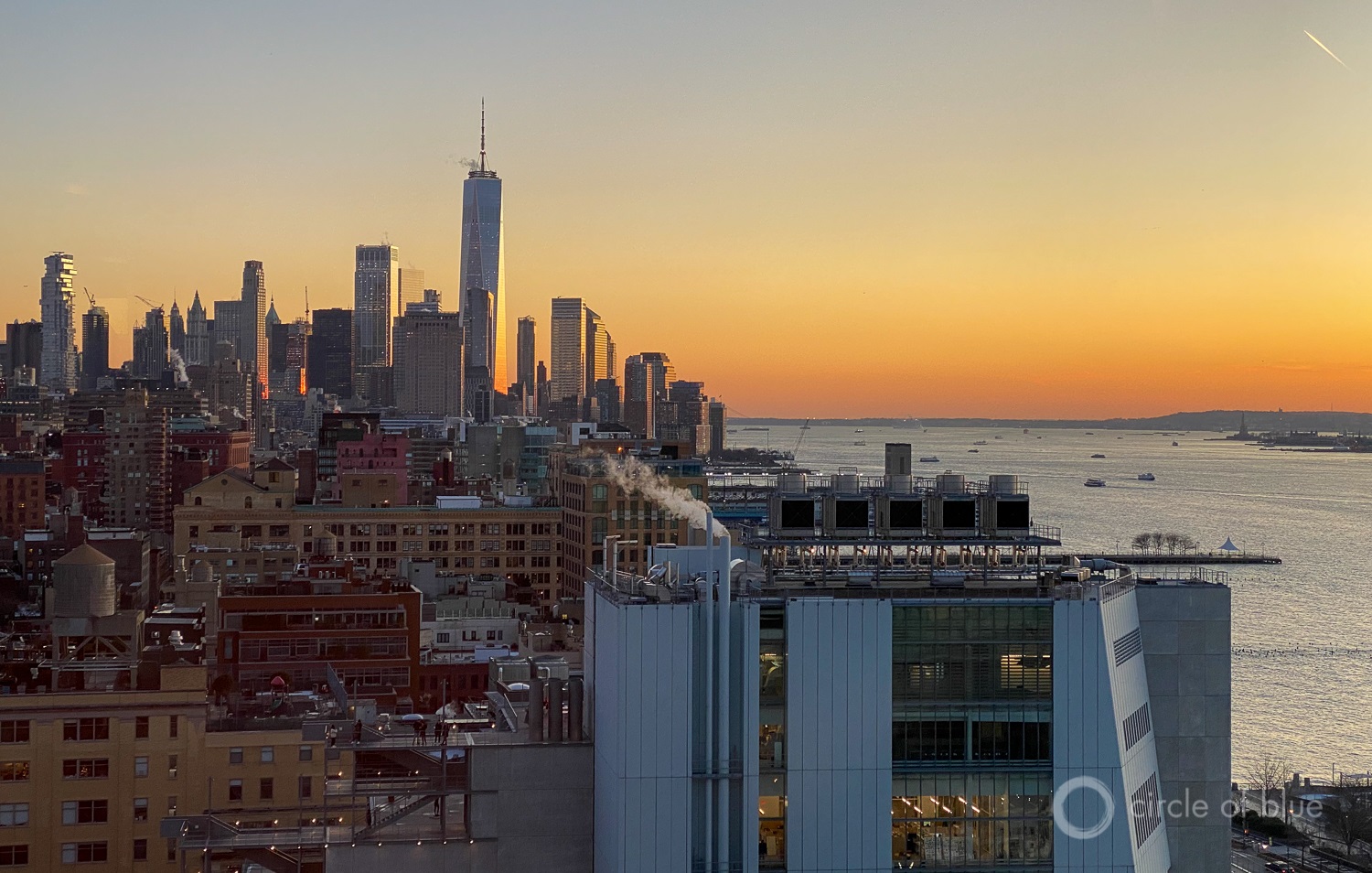High-profile water-related issues were also on the ballot in Maine, Boise, and Virginia Beach.

The New York City skyline and the Hudson River. Photo © J. Carl Ganter/Circle of Blue
- New Yorkers approved an environmental rights amendment in their state constitution.
- Voters in Boise and Virginia Beach authorized infrastructure spending plans that exceed a half-billion dollars.
- Maine voters decide to ban a transmission line for importing hydropower from Quebec.
By Brett Walton, Circle of Blue – November 3, 2021
A movement to enshrine individual rights to clean air and water in state constitutions received a boost yesterday.
By a large majority, New York voters approved the addition of an environmental rights amendment to their state constitution.
Nearly 61 percent of voters endorsed the inclusion of new language in the state Bill of Rights. That foundational document will now protect the right to “clean air and water, and a healthful environment.”
The clear majority — ‘yes’ votes exceeded ‘no’ votes in 51 of New York’s 62 counties — “speaks to the fact that in deeply polarized times, the value of a healthful environment can bring people together,” Peter Iwanowicz told Circle of Blue. Iwanowicz is the executive director of Environmental Advocates NY, the organization that spearheaded the campaign for the amendment.
The change could have consequences. In states like Pennsylvania that have similar constitutional language, courts have pointed to the amendments as justification for striking down state laws that put a healthy environment at risk. Iwanowicz said that it could force municipalities to do more planning on the front-end to ensure that they are not sued.
The New York vote could rejuvenate a trend that previously flourished in the 1970s. Campaigners in least a dozen other states, including Maryland and New Mexico, are working on environmental rights amendments.
In Maine, voters faced a question of immediate relevance. There, an expensive battle was waged over the construction of a high-voltage transmission line to import hydropower from Quebec into New England.
It appears that a measure to ban the construction of the New England Clean Energy Connect transmission line will win. According to the Press Herald newspaper, the measure received 59 percent of the votes with nearly all precincts reporting.
Melissa Packard, Maine director of elections, told Circle of Blue that the state is not required to have official results for 20 days following the election, and it does not publish preliminary tallies.
Construction had already begun on the transmission line, which was designed to deliver hydropower from Quebec to Massachusetts in order to meet that state’s clean energy target. Opponents of the project objected to their state being used as an “extension cord” when it would receive only five percent of the electricity. The campaign to ban construction was largely funded by energy companies operating in Maine.
In local races, voters in two cities supported public works plans exceeding a half-billion dollars that will help address the pressures of droughts and floods.
Eighty percent of voters in Boise, Idaho, were in favor of a 10-year, $570 million bond measure that will revamp the city’s wastewater infrastructure. As a result, an average sewer bill is expected to rise about nine or 10 percent per year over the next two decades.
The funds will upgrade a wastewater treatment plant built in 1948. The spending plan, which was approved by City Council after extensive public consultation, also includes investments in smaller treatment facilities that will purify water to the point that it can be reused in the arid, high-growth city.
In Virginia Beach, meanwhile, voters supported a property tax increase that will provide revenue for projects to protect the low-lying city from flooding during heavy rains.
The 10-year, $567 million flood protection program, which was already approved unanimously by the City Council, passed with 73 percent voter approval. Property taxes for an average home will increase $115 to $171 per year, depending on how the bonds are structured.
The projects are a mix of stormwater retention basins, drainage pipe improvements, tidal gates, marsh restoration, and raising the height of roads. They are not designed to protect against a strong hurricane, but they will guard neighborhoods from heavy rains.
John Moss, a Virginia Beach councilman, told Circle of Blue before the election that the projects are worth the cost for a coastal city located in a sea-level rise hot spot.
“If we don’t make a significant investment and make changes in policies, we are not going to be able to protect about 65 percent of our structures by 2050,” Moss said.
Brett writes about agriculture, energy, infrastructure, and the politics and economics of water in the United States. He also writes the Federal Water Tap, Circle of Blue’s weekly digest of U.S. government water news. He is the winner of two Society of Environmental Journalists reporting awards, one of the top honors in American environmental journalism: first place for explanatory reporting for a series on septic system pollution in the United States(2016) and third place for beat reporting in a small market (2014). He received the Sierra Club’s Distinguished Service Award in 2018. Brett lives in Seattle, where he hikes the mountains and bakes pies. Contact Brett Walton



